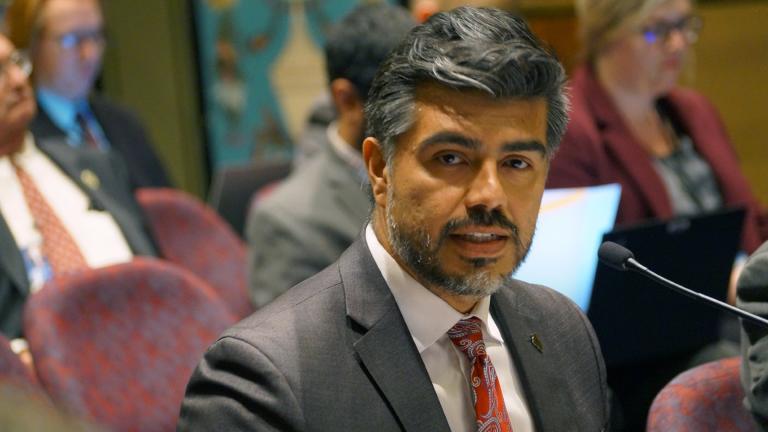Illinois’ coronavirus-related ban on evictions is coming to an end.
Gov. J.B. Pritzker says the state will allow eviction orders to be enforced after Aug. 31 — more than 17 months after the moratorium was issued. This comes as the city and state point tenants and landlords toward assistance grants — of which tens of thousands have applied.
According to officials 26,850 Chicagoans have applied for $137 million in grant money. But the city has just $80 million available and expects another $100 million this fall.
Read: Demand for Rental Assistance in Chicago Outstrips Available Funds as End to Eviction Ban Looms
Meanwhile, a survey by the Neighborhood Building Owners Alliance found that Chicago housing providers have not been paid at least $1 billion since the beginning of the pandemic.
COVID-19 and its economic fallout has had a significant impact on housing, including in Latino communities, said Joseph Lopez, executive director of the Spanish Coalition for Housing.
“The impact is profound in terms of the destabilization of many households throughout the pandemic,” Lopez said. “The eviction moratorium helped to subdue that. As it’s now being lifted, the other part of the equation is to ensure households access the rental assistance that is coming online, and the additional round of funds.”
The city and state have created a variety of grant programs to assist renters and landlords.
“The relief programs from the multiple government levels, federal, state and city, have been critical to stabilize, given that the pandemic situation — the economic fall out that resulted from it — has been unprecedented in our lifetime,” Lopez said. “The public subsidies being made available are really helping to mitigate the larger looming crisis.”
Luz Maria Ramirez Gonzalez, an intake specialist at the Northwest Side Housing Center in Belmont Cragin, has helped renters fill out the applications for the rental assistance grants.
“It’s a process,” Ramirez Gonzalez said. “We cannot tell them, ‘Oh, yeah, you’re approved today, and you get the money tomorrow.’ It’s a process. It’s taking a little long, but we’re trying to make them feel good and confident that they will receive something little by little. Nothing is for sure, but we have to give some hope.”
Ramirez Gonzalez says some of her clients have been struggling to pay for rent, alongside other bills.
“They buy groceries to feed their families, or they pay rent, or they pay a light bill or gas bill or insurance or they have an emergency. It’s difficult,” she said. “They are really nervous and afraid that [their landlords] can kick them out of their apartment.”
Elvira Maya says immigration status and language barriers have been challenges for some clients she works with. Maya is a housing counselor at Neighborhood Housing Services Chicago.
“A lot of them because they may be undocumented, they’re scared to get assistance. They’re scared to ask because they’re not sure what the ramification could be if they were to say, ‘Hey, I don’t have documents and I am looking for assistance, are you going to report me?’” Maya said.
Some clients haven’t applied for programs because they didn’t think they were eligible, she said.
Maya has been working with homeowners to help them avoid foreclosure through forbearance.
“Some of my clients own one-unit, two-unit properties and it’s not just them that are struggling financially but their tenants are also struggling financially,” Maya said. “So now they don’t only have that loss of income due to their loss of employment, but also due to the fact that they don’t even have that rental income coming in.”
Many of her clients have conventional mortgages that aren’t covered by the federal government, which make it harder for them to obtain forbearance, she said.
“My concern is that once that forced eviction process commences that they will be evicted, due to the fact that they’re still not back at work,” Maya said. “I have seen a lot of clients where their hardship has not been cured. They’re still facing hardship. Others have had to turn to different lines of work.”








